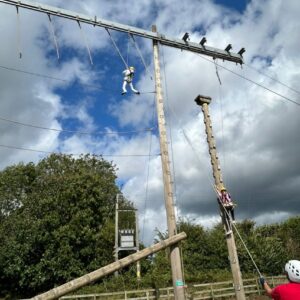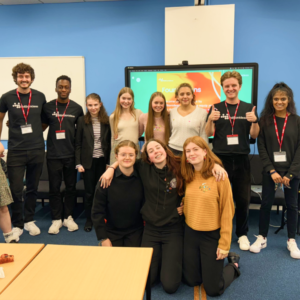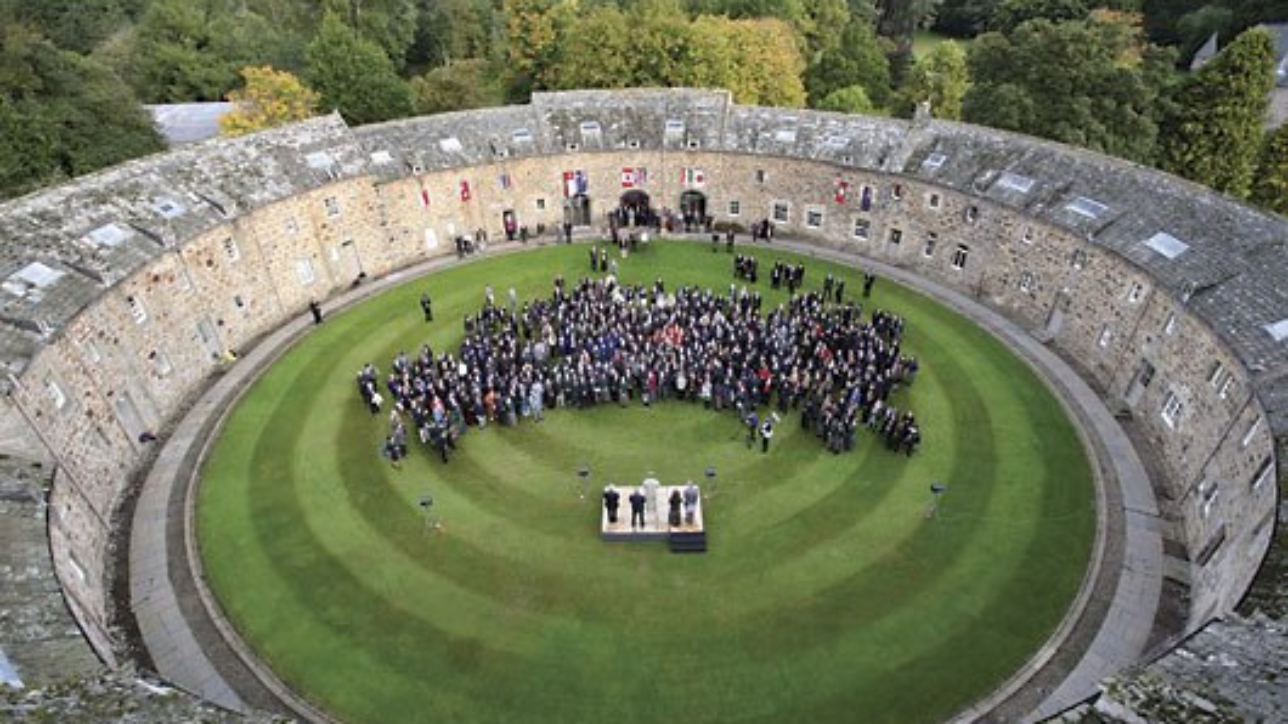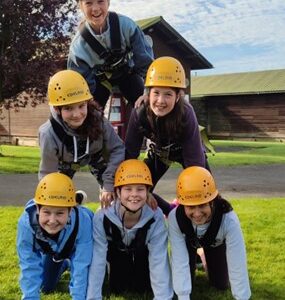We have had the pleasure of launching our new Pathfinder lessons in Year 7 and Year 8 this half term. This is an exciting new opportunity to expand the curriculum in two distinct areas; Discovery Education and Future-Focused Education. In our 140th year, it is apt that we are channelling the same spirit of adventure that had once inspired Rose Kingsley to explore the mid-West of the United States and found a new school with the ethos that made high quality education accessible to all.
So why are these lessons called Pathfinder lessons? There is literal and a metaphorical aspect to this. In a literal sense, pupils will get the opportunity to find their way. In classes on orienteering, navigation and exploring the great outdoors, pupils at Kingsley will experience the spirit of adventure and learn how to challenge themselves with new skills. In a metaphorical sense, pupils will get the opportunity to find their way to their own future; this may be through developing the skills required to succeed and thrive in the world of the 21st century, or to consider what career paths they may wish to follow. Over the course of the academic year, pupils will spend half of their time on the Discovery Education aspect and half of their time on the Future-Focused Learning.
The phrase “Future-Focused Learning” is open to variety of interpretations. It can conjure up mental images of the latest IT product repurposed for the classroom, such as a virtual reality tour of the Jurassic era or ancient Rome. However, this is a superficial application of what is a complex and continuous debate. As you would expect, there are many unknowns for the future of education, especially when considering the environment of significant technological, political and social change. Over the last few hundred years, new and transformational general purpose technologies– GPTs- which by definition change the way we live and work, have become ever more impactful in just a handful of generations. Of the 24 cited by economists Richard Lipsey and Kenneth Carlaw[i], 12 of them are from the last 200 years. As an example, the comparison between everyday life prior to mass media and after, shows that new technologies can have a profound impact on the way people think, what they do for entertainment, and how they learn. The impact of mass media technology in the early twentieth century- the radio and then the television- continued to have profound impacts on society that has influenced identity, politics and our awareness of the world. Society in the late twentieth century was nearly unrecognisable to that experienced by people in the Victorian era.
The most recent GPTs as cited by Lipsey and Carlaw have all occurred within the last generation: the computer; the internet; lean production; biotechnology and nanotechnology. These have all meant that each generation of students in recent decades have had to contend with a rate of change that is much faster than previous generations, having to learn new skills, understand new concepts and apply innovative ideas in a meaningful and effective way. There is much debate over what the next GPTs are, with the development of generative AI having the potential to revolutionise the world of work, social interactions, art and culture, and the acceleration of the development of further technologies. Similarly, nanotechnology and the exploration of quantum computing could have further implications for the processing power of AI tools, which could open up far more opportunities for what can be achieved within a generation from now.
Future-Focused Education not only needs to take this into account, but also the development of the skills and knowledge that will allow people to thrive in an economy that is not yet fully realised. Guy Claxton, a notable cognitive scientist, theorises that an education fit for the future should focus on creating a culture of continued learning, throughout each stage of life, rather than retaining isolated knowledge without connections or meaning. Claxton refers to “Building Learning Power”[ii], which is a framework of 4 Rs that encourages students to be more resilient, resourceful, reflective, and reciprocal. That is, students learn to be ready, willing and able to learn, manage distractions and persevere through difficult tasks. They learn to ask questions, think critically, and work efficiently by planning, revising and organising their learning. They learn to share and collaborate, develop empathy and develop good social relationships and values. As such, Claxton argues that education should focus on preparing students to be better learners, rather than focusing on what should be learned alone.
Educationalists Bill Lucas and Ellen Spencer have applied these ideas of developing lifelong learners by focussing on how schools can develop creative thinking.[iii] Creativity is at the heart of an educational system fit for the future. As such, creativity needs to be considered in a more horizontal way, rather than fostering creativity in the creative arts subjects. All subjects require creative thinking, especially when students are encouraged to use a range of creative and learned responses to solve problems and challenges in a variety of contexts. In practical terms, schools should aim to promote intellectual curiosity, foster collaborative working to improve creative thinking and allow students to be imaginative and think outside the box. In order to teach pupils how to apply these skills in the real world, education should also furnish them with the persistence to see the problem through. Schools that focus on the development of these areas are fostering the skills that will help students to thrive in the modern world.
Our partner in Future-Focused Education, 8billionideas, help us to promote these ideas and values both in our days off timetable, but as part of the new Pathfinder curriculum. 8billionideas work with us to foster creativity, teamwork and collaboration. In Year 7, this is through a range of projects that will encourage creative thinking, entrepreneurship, self-reflection and sustainability. Currently, pupils are working on their new business proposals to pitch in a ‘Dragon’s Den’ style exercise, and later on we will look forward to the project that helps them to become ‘world class designers’. In Year 8, pupils will learn more about the ethics and challenges of Artificial Intelligence. This will cover how it works, how it was developed and how it can be used ethically. Part of this will include learning to evaluate the reliability of information and how AI requires us to apply complex critical thinking skills in an ever more challenging environment. We are excited to work with Year 8 on these future focused projects throughout this academic year. In our Pathfinder lessons for both Years 7 and 8 we look forward to developing more creative critical thinkers with the resilience to see their ideas through to fruition.
The second aspect of the Pathfinder lessons is the Discovery Education, which is another fundamental part of an education fit for the future. In engaging with the spirit of adventure, we foster the attributes and skills that are referenced in the work of Claxton, Lucas and Spencer. This is particularly true when pupils are working in collaboration with each other, solving problems together and learning how teams and leaders work in harmony. More than this, students learn what they are capable of when they are out of their comfort zone and challenging themselves to succeed. The German educationalist Kurt Hahn noted that “There is more in us than we know. If we could be made to see it, perhaps for the rest of our lives, we will be unwilling to settle for less.”[iv] Hahn believed that education should focus on character development, which is influenced by real world challenges. His programmes aimed to push individuals beyond what they think they can do in order to reveal hidden strengths. Through experiential learning, pupils can unlock their full potential and learn how to make a real and positive impact on the world.
With an experiential learning and the engagement in outdoor pursuits, pupils develop attributes and knowledge that exemplify The Kingsley Way. Hahn noted that a spirit of adventure encourages students to take managed risks, face challenges and stretch to reach a personal goal in any hobby or area of interest. Courage, discipline, tenacity and resilience are all developed and from this, pupils grow into young adults that are ready to embrace uncertainty and become pioneers in any field of interest that inspires them. A nurturing of the physical, mental and emotional strength to succeed is an important part of Hahn’s approach. Furthermore, when working as groups, pupils will be on this learning journey in partnership with others, learning that it is possible to grow and develop collectively to achieve more than they can whilst working alone.
Hahn’s work inspired the foundation of schools and colleges and outward-bound programmes across the world. Two of these schools were Salem School in Germany and Gordonstoun School in Scotland. Most relevant for us, Hahn’s ideas were the inspiration behind the foundation of the Round Square, an organisation of over 150 schools across all continents which subscribe to the same educational philosophy which started as a collaboration between Gordonstoun and Salem. In fact, the name “Round Square” comes from the Round Square building at Gordonstoun where the first meeting was held. Gordonstoun legend suggests that this building was built by an apothecary trying to avoid being cornered by the devil and being taken to hell, which if nothing else shows a creative approach to solving problems. Each Round Square school has a commitment to the six core IDEALS: Internationalism; Democracy; Environmentalism; Adventure; Leadership and Service. Much of The Kingsley School’s commitments to these IDEALS leads to the development of those characteristics that we have been referring to. During Pathfinder lessons pupils will learn outdoor pursuits such as orienteering, navigation and route planning, climbing, forest school and leadership skills. This, coupled with other co-curricular opportunities including our trips to the Pioneer Centre, residential trips, the Duke of Edinburgh Awards and Round Square conferences means that our pupils will experience an outdoor education that will make a real difference on how they understand the world and how they can overcome its challenges.
It is of note that Hahn was developing these ideas in the early twentieth century. Salem School was founded in 1920, Gordonstoun in 1934 and the international organisation Outward Bound founded in 1941. However, the attributes that flow from his ideas: courage, compassion, communication, teamwork, resilience and service are just as relevant for the next century as they were to the last. The new and upcoming GPTs that will revolutionise the way we live and work will have the same profound impact as those that were emerging one hundred years ago; the future of education has always been about ensuring that pupils have the skills, knowledge and attributes to succeed and make a difference. The development of “future skills” is timeless; supporting pupils to find their path- both physically and metaphorically- is the hall mark of a well-rounded education. This is The Kingsley Way.
Mr Peter Bucknall, Deputy Head (Academic)
[i] Richard G. Lipsey, Kenneth I. Carlaw, and Clifford T. Bekar Economic Transformations
General Purpose Technologies and Long-Term Economic Growth 2005
[ii] Guy Claxton, The Learning Power Approach, 2017
[iii]Bill Lucas and Ellen Spencer, Teaching Creative Thinking: Developing Learners Who Generate Ideas and Can Think Critically, 2017
[iv] The Round Square: https://www.roundsquare.org/being-round-square/what/




